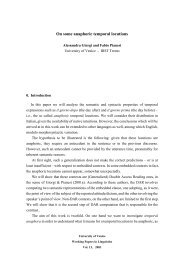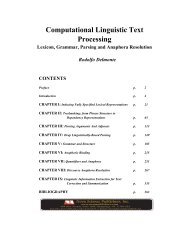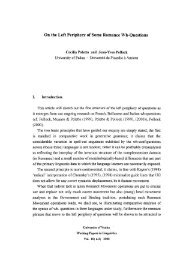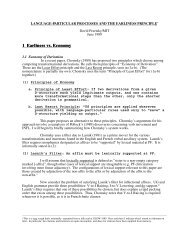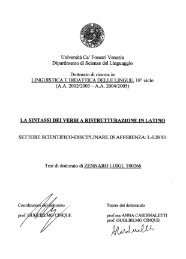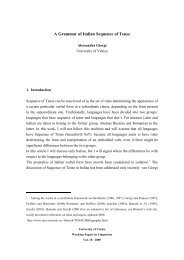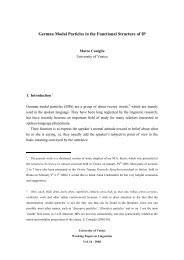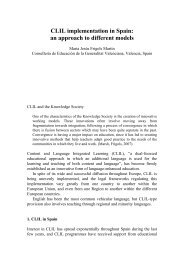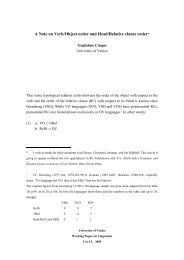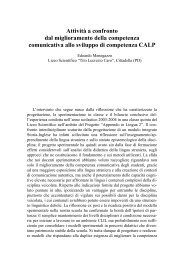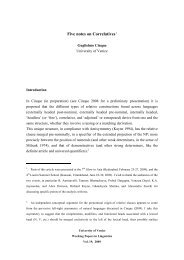1 GAPS, GHOSTS AND GAPLESS RELATIVES IN ... - ling.auf.net
1 GAPS, GHOSTS AND GAPLESS RELATIVES IN ... - ling.auf.net
1 GAPS, GHOSTS AND GAPLESS RELATIVES IN ... - ling.auf.net
You also want an ePaper? Increase the reach of your titles
YUMPU automatically turns print PDFs into web optimized ePapers that Google loves.
. This (= Frank Lampard) is a player [who you can’t say that we’ve failed<br />
just because we’ve included Frank Lampard] (Adrian Durham, Talk Sport Radio)<br />
By hypothesis, such structures involve a relative wh-pronoun used as the complement of<br />
the capitalized ghosted preposition to/about. The resulting structures are ungrammatical<br />
if the capitalised preposition is not ghosted. Why should this be? The answer lies in a<br />
Preclausal Preposition Constraint/PPC which (in informal terms) bars a preposition from<br />
being stranded in front of a clause. PPC will account for contrasts such the following:<br />
(59) a. someone who I can talk [VP to [V ] about my problems]<br />
b. *someone who it seems [VP to [V ] that the glass is half empty]<br />
In both structures in (59), the preposition to has been stranded in spec-VP: however, in<br />
(59a), to is stranded in front of a PP argument and the resulting structure is grammatical; by<br />
contrast in (59b) to is stranded in front of a that-clause argument and the outcome is<br />
ungrammatical. In the light of this constraint, it is plausible to suppose that ghosting of the<br />
preposition about in structures like (58) serves to repair a potential violation of PPC.<br />
Furthermore, the extended Ghosting operation which takes place in structures<br />
involving Predicate Ghosting can also serve to repair PPC violations – as we can illustrate<br />
in relation to our earlier structure (52), repeated below:<br />
(52) You look at some of the other papers, who it’s not going to be<br />
just the ‘News of The World’ running dodgy practices<br />
The preposition about is in stranded in spec-VP, so that overtly spel<strong>ling</strong> it out would lead to<br />
violation of the Preclausal Preposition Constraint. Ghosting in (52) deletes (inter alia) the<br />
illicitly stranded preposition, and so ‘repairs’ the relevant structure.<br />
Ghosting can also be used to repair potential violations of other constraints, as the<br />
following examples illustrate:<br />
(60) a. It’s something that we have been training for a long time (Tom Daley, BBC<br />
Radio 5)<br />
b. That’s what we paid the money for you (Alan Shearer, BBC1 TV)<br />
c. The standard fix is to replace just the offending bushes – something a main dealer<br />
will charge around £600 for parts and labour (Edd China, Discovery TV)<br />
d. Jenny Meadows wants to get back to her main event, which she can certainly do<br />
some damage in the European championships later this year (Steve Cram,<br />
BBC1 TV)<br />
If the angle-bracketed preposition were stranded by WH-MOVEMENT and pronounced in the<br />
position which it occupies in (60), the resulting structure would violate an Iteration<br />
Constraint which bars successive occurrences of the same item (Radford 1979, Bošković<br />
2002, Demonte & Fernández-Soriano 2009) – e.g. two successive occurrences of the<br />
preposition for or of the preposition in 14 . However, Ghosting provides a way of rescuing<br />
such structures, as we can illustrate in relation to (60a). Let us suppose that the relative<br />
clause in (60a) contains the relative wh-pronoun which used as the object of the preposition<br />
for. Let us further suppose that which undergoes Prepositional Inversion and thereby moves<br />
to spec-PP, forming [PP which [P for] ]. If the resulting PP then moves to spec-CP,<br />
this will derive the following structure:<br />
(61) [CP [PP which [P for] ] [C that] we have been training for a long time]<br />
The resulting CP violates the Edge Constraint in that it has both an overt C head (that) and<br />
an overt PP specifier (which for ). Ghosting of the PP specifier results in:<br />
20



